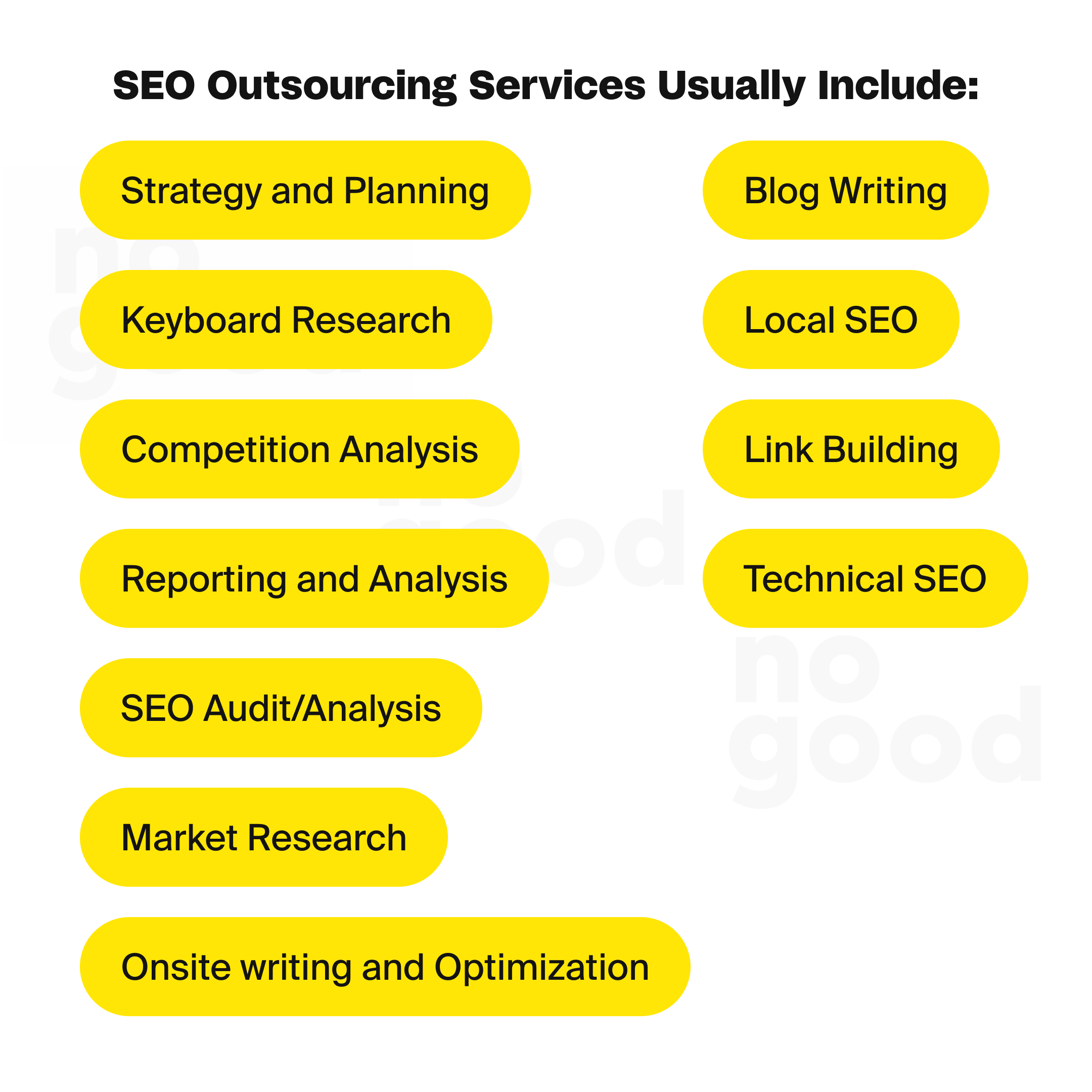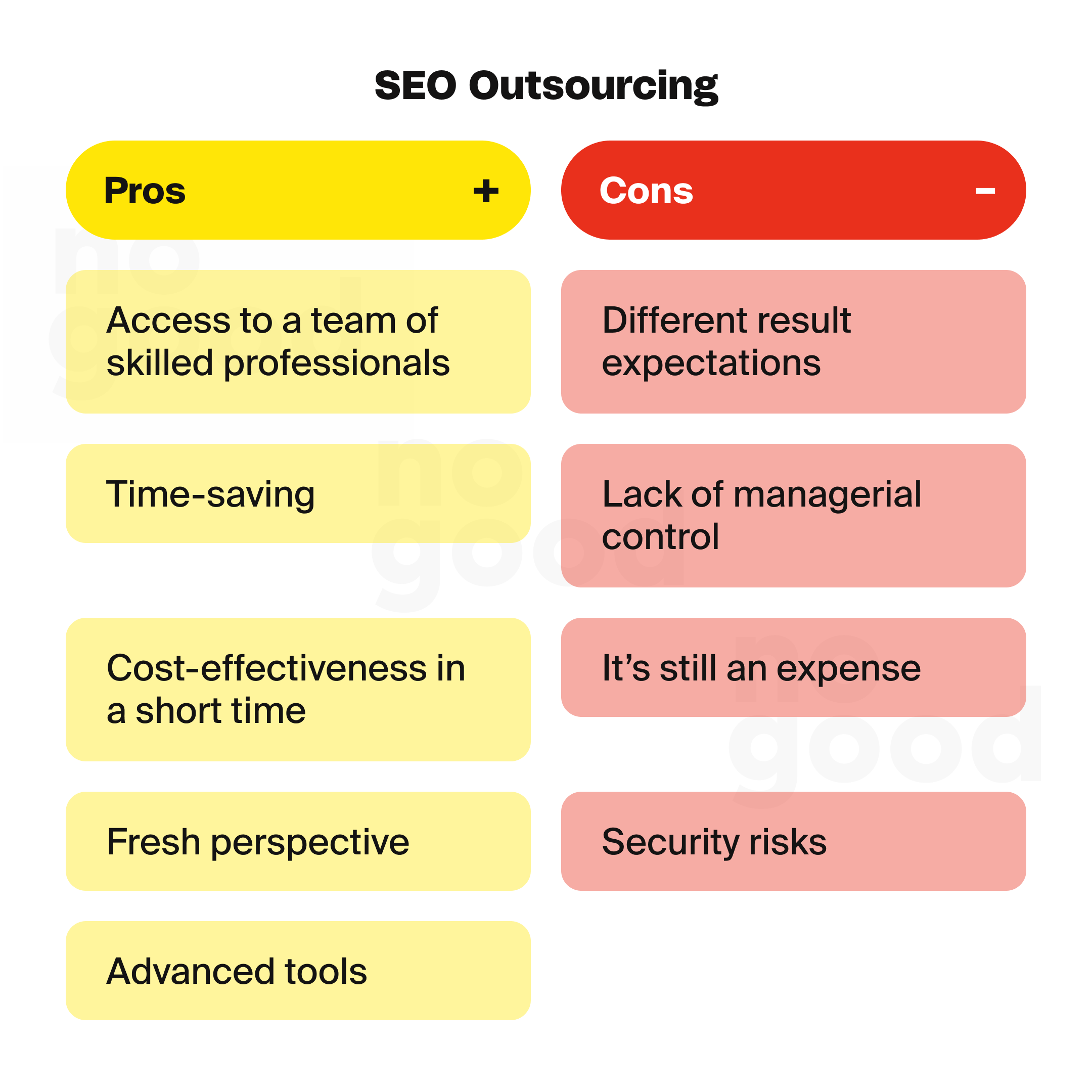With ad space becoming more expensive and results more competitive, businesses are looking at organic search more than ever to supplement and drive growth. If you’ve been in the SEO game before and struggle to find gains, you might benefit from outsourcing these efforts. SEO is a channel of marketing that craves ROI, if you’ve been putting a lot of effort toward it and not seeing a reciprocal growth, you might want to think about outsourcing these efforts.
Looking to outsource your SEO efforts?
Businesses have to be more dynamic than ever before. If you’re wearing a lot of hats and one of them happens to be SEO, offloading some of this could be the key to increasing your company’s visibility. SEO requires constant attention to changing search algorithms, content optimizations, keyword research and more. It’s a day-by-day practice and if you’re looking for that type of dedication, finding an expert partner is a must.
SEO efforts compound the longer you put the work in. Building the web of organic keywords and authority is a way that Google recognizes and ranks your results. If you aren’t thinking about that, maybe your competitors are? As organic search results evolve, getting listed at the top of search results is only going to get more difficult.
Types of SEO Efforts to Outsource
SEO services can reach far and wide, so tailoring services to your brand is key. If you’re not sure what makes sense, an SEO agency will be able to help you identify the gaps in where you are, where you want to be, and a path to get there. Here are a few of the common activities businesses tend to outsource:

- On-Page SEO: On-page SEO looks at everything from title tags, header tags, images, user experience and aligns these elements to current and changing ranking signals.
- Off-Page SEO: This includes activities such as link building outreach to increase the authority and visibility of a website.
- Technical SEO: Resolving technical SEO debt creates a better user experience and a better path for search engines to discover your content and share that with searchers.
- Local SEO: This focuses on optimizing a website for local search results, including local keyword targeting, Google My Business optimization, and local directory listings.
- Content Creation: Creating high-quality, relevant, and engaging content for websites, blogs to attract and engage your ideal customer and improve search engine rankings.
- Keyword Research: This involves identifying relevant keywords and phrases that potential customers are using to search for products or services and incorporating them into website content and SEO strategies like content creation.
- SEO Audits: Crawling and analyzing a website’s SEO performance, identifying issues and areas for improvement, and developing strategies to improve search engine rankings and technical SEO scores.
- Reporting and Analytics: Monitoring and analyzing website traffic, keyword rankings, and other SEO metrics to measure the effectiveness of SEO strategies and make data-driven decisions.
Cons of Outsourcing SEO
While the benefits outweigh the drawbacks, companies can have some hesitation partnering with someone new on a portion of their operations. You’ve built up the business to what it is today, and your partner should understand that, too. Here are some things to consider when picking the right partner for you:

1. Industry Knowledge
One potential drawback is industry knowledge. You might want to work with someone but are concerned about how much of their own knowledge about your industry they’re bringing to the table. While most would look at this as a gap, some agencies see this as an opportunity. The best agencies will dedicate a large portion of their onboarding time to discovery work.
When you have a qualified agency who is passionate about knowing the inner workings of industries, you can often uncover things you’re overlooking. Sometimes when you’re too close to something it’s hard to see the things others would. Having a third-party do this digging might show you things you were overlooking.
2. Control of SEO Process
Controlling the SEO process can be tricky. When you have a lot of cooks in the kitchen, sometimes progress can be slow. Many SEOs have differing opinions about how things should be implemented or targeted and this can lead to dissatisfaction between teams.
Dynamic teams should be able to find an area where they ‘plug-in’ well and then assist in management from there. Having control over the SEO process should be a dying battle as performance increases.
3. Communication Issues
Communication can be difficult even in a world of screens and connectivity. Communication styles are learned and with repetition most communication barriers can be resolved but sometimes clashing is inevitable.
If communication is a hot button issue for you and your organization, connect upfront with partners about their preferred methods of communication. Technology should be there to help the best ideas shine through, not suppress them. Communication is the key to a mutually beneficial relationship.
4. Quality Concerns
You have a lot to manage as is it so it’s inevitable that you won’t be able to see everything before it goes live. In most engagements, partners are heavily involved in the approval process early on as they build trust. Even when trust is built, sometimes things can fall outside of the lines of acceptability.
For most, this might just be a learning experience about what a client is comfortable with but others might be a mis-match. You’ll know a good partner when you experience what they do when they address the issue. If they handle it with grace, you’ll know you’re in good hands.
5. Risk Of Dependency
Many businesses worry about becoming dependent on marketing agencies. While no business wants to build a dependency, it’s worth noting that agencies usually have access to a wider and more advanced set of tools, candidates and processes. Why? Because that’s what we do. You’re running a business and marketing becomes a never-ending competition between you and whoever is trying to replace you.
The dependency isn’t the agency, it’s the marketing at a whole. You’ll never need to stop marketing, the question is, how much is your time worth? And does that effort move the needle?
Pros of Outsourcing SEO
1. Time-Saving
Marketing teams across the world are all fighting for space, whether that’s ads or organic results. In-house teams often execute at a much slower pace than an agency. Internal teams wear a lot of different hats where an agency will have teams built with specialized members that know the ins and outs of their practice. They focus all their efforts on refining strategy and how they can help brands grow.
When you compare the time spent on marketing efforts, agencies get much more exposure to a variety of problems and build processes to resolve it efficiently and effectively.
2. Cost Effective
If you’re willing to invest in a new hire to manage your marketing efforts, you might want to consider hiring an agency at almost the same rate. When you partner with an agency, you can often get a team of people for the salary cost of one. It’s an effective way to bring a creative group of minds together to achieve a common goal.
3. Faster Results
Being able to quickly identify a problem, create a process, and scale that process is what agencies are built on. Having these effective workflows in place allow agencies to produce high-quality results at a faster pace.
4. Focus on Key Activities
Outsourcing SEO allows you to offload the time-consuming tasks of keyword research, content optimization, and link building to professionals who specialize in these areas. This means you can redirect your internal resources towards activities that directly impact your business’s bottom line, such as product development, customer service, or sales strategies.
5. Access to Tools & Resources
Agencies have overhead just like every other business but a big portion of that is access to tools. Where most businesses won’t spend their money, agencies double down. Marketing minds are more valuable than marketing tools but they certainly help. When you partner with an agency, you know that you’re getting premium insights and understanding from your data beyond what you had before.
How To Outsource Your SEO Efforts
Outsourcing SEO efforts is a case-by-case for most businesses. Every solution is unique and needs its own set of strategies and tactics to find growth. While every goal is different, identifying where you want to be is a great place to start. Start with the goal and challenge the partner you pick to define the path to get there.
1. Define Your Business Goals
Before you reach out to an agency, you have some homework to do. It’s crucial that you define a crystal clear goal. No need to make it complicated. If it’s revenue you’re after, or growing an app, having a clear number to move toward makes everything easier for the agency to create a plan.
2. Understand Your Audience Better Than Anyone
Understanding your audience and communicating those insights is gold for marketers looking to properly position a business. Specific terms, pain points, demographics, the list goes on, it’s all valuable. Any good strategy starts with an in-depth look at your ideal customer, this creates the foundation teams can build on as they gain insights.
3. Research & Decide on an SEO Partner
Deciding on an SEO partner is the whole reason you’re reading this in the first place. Deciding on a partner comes down to much more than the obvious. You need someone who has expertise, experience in your industry, and a proven track record.
You also need a partner who you wouldn’t mind getting a coffee with. Finding an agency that truly feels like an extension of the team is a feeling that will resonate with both the business and the agency. We as marketers are on the hunt for equally passionate partners that meld well with our team.
4. Agree on Services
If you’re savvy in SEO and already know what you need for services, you’re a step ahead. For those looking for recommendations, agencies will be able to work with you to build a plan to achieve your goals.
- Services: Decide on the scope of work. Understand how each service is directly tied back to your business goal. Raise any questions about types of services and cadence up front to ensure proper execution and alignment.
- Cost: Cost is unfortunately very hard to estimate as every agency uses their own pricing model. The amount you chose to invest should be in line with what you expect to return. Oftentimes if businesses are looking for high impact at a rapid pace, this takes more effort on a monthly basis driving up costs. Finding a balance between pace and budget is key.
- Timeline: Timeline, like I said, can be tied to cost but it can also be tied to industry/vertical. Some industry spaces are purely just more competitive, that’s not to say growth isn’t possible, but may require increased efforts. Timeline is also a responsibility of the client to keep on pace with approvals and reviews.
5. Monitor Performance and Iterate
Any good agency is going to provide monitoring of performance and analysis on that performance to determine trends or if a different strategy is needed. Some like automated reporting without meetings, some want to be on the phone digging through the data. Ask to see some sample reporting from your potential partners if you’re looking for something specific.
When Businesses Should Outsource SEO
Understanding when to outsource SEO is at the crossroads of effort and benefit. Are you benefiting enough from the effort you’re putting into your strategy? Are you keeping up with trends influencing content strategy?
If you’re not giving SEO the time and effort it deserves, it might be time to pull in a team that eats, sleeps, and breathes the industry. Working with an agile SEO can show you what it takes to truly be up on all the different things happening within the realm of search engines. SEO is a process that can be started at any stage of business so there’s no bad time to start but once you start, you have to be all in.
If you’re looking for a way to generate compounding growth, an SEO partner will be able to set up and grow your existing strategy so you can achieve your goals more efficiently.
Partner with An Expert
Take time to do your research. With SEO rising to marketing fame, everyone and their brother thinks they’re an SEO. Being an SEO practitioner requires dedication to being updated, thoroughness of work, and user alignment. Having an experienced partner at your side is valuable when it comes to hitting roadblocks or needing to pivot.
If you’re looking for results, NoGood is no stranger to growth. We’ve helped brands in a variety of industries achieve their organic goals, don’t believe us, see for yourself.




